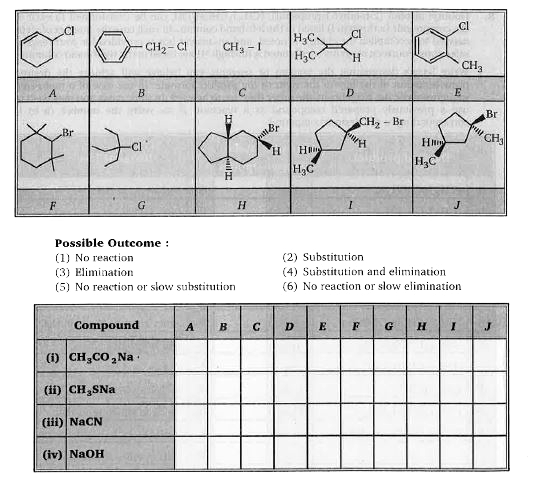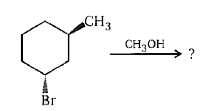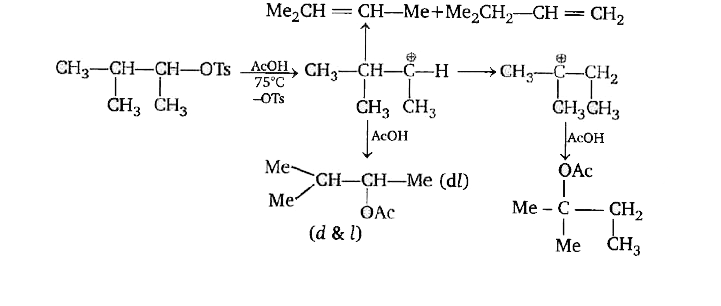In solvolysis of 1, 2-dimethyl propyl p-toluene sulfonate in acetic acid at 75∘C, (alkene + substitution products) will be formed by mechanism? Solution in Telugu
2
3
4
5
The correct Answer is:D
Topper's Solved these Questions
- 5C ALKYL HALIDES BOOK - MS CHOUHANCHAPTER - 5C ALKYL HALIDES EXERCISE - LEVEL-2
3 Videos
- 5C ALKYL HALIDES BOOK - MS CHOUHANCHAPTER - 5C ALKYL HALIDES EXERCISE - LEVEL-2 (SUBJECTIVE PROBLEMS)
1 Videos
- ALCOHOL,ETHERS AND EPOXIDESBOOK - MS CHOUHANCHAPTER - ALCOHOL,ETHERS AND EPOXIDESEXERCISE - SUBJECTIVE PROBLEMS
1 Videos
Similar Questions
The following organic halide derivatives (A to J) are reacted in ethanol solution with each of the nucleophiles : acetate, methylthiolate, cyanide and hydroxide anions. Six possible results from these combinations of reactants are designated (1) through (6) below:
Write the number corresponding to your best estimate of the outcome ofeach reaction in the appropriate answer box below.

View Solution
X = Total number of substitution and elimination product(s). Find the value of X.
View Solution
Maximum number of moles of Ac2O consumed by reactant (A) is :
View SolutionIn solvolysis of 1, 2 -dimethyl propyl p-toluene sulfonate in acetic acid at 75^(@)C , (alkene + substitution products) will be formed by mechanism?
View SolutionOn acid hydration of how many alkene 2,3-dimethyl-2-butanol will be produced?
View Solutionin solvolysis of 1,2-dimrhtyl propyl-p-toluene sulfonate in acidic acid at 75^(@) C, How many (alkene +Substition ) products will be formed ?
View SolutionExplain the mechanism of acid catalysed of an alkene to form corresponding alcohol.
View Solutionआइसो प्रापिल एसीटिक अम्ल का सूत्र लिखिए।
View Solution4 - मेथिल बेन्जीन सल्फोनिक अम्ल , सोडियम ऐसीटेट के साथ क्रिया करके देता है
View SolutionBenzoic acid is mainly formed in sulfonization
View Solution4-Methyl benzene sulfonic acid reacts with sodium acetate
View SolutionExplain the mechanism of acid catalysed of an alkene to form corresponding alcohol.
View SolutionIntermediate product formed in the acid catalysed dehydration of n-propyl alcohol is:
View SolutionThe alkene formed by dehydration of n-propyl alcohol is _____
View SolutionExplain the mechanism of the following reactions : Acid catalysed dehydration of an alcohol forming an alkene.
View SolutionTertiary alkyl undergoes solvolysis in either acetic acid or in ethanol.What is the solvolysis product in each solvent?
View Solution

